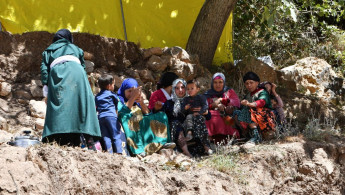A week since Morocco's deadly earthquake, survivors struggle with PTSD and other mental health needs
A week after a deadly earthquake destroyed Azrou village, Asma says she still feels the earth shake beneath her feet and still hears the helpless cries of her grandfather before he vanished under the rubble.
"I made it safe, not a scratch, thank god. Everyone tells me I am okay, but I don't feel okay. My heart is sick," says Asma, a 19-year-old villager who lost three family members in the 6.8 magnitude that ravaged six provinces of the North African kingdom.
In Azrou, an Amazigh village located 47 km from Marrakech, at the hill of Mountain Toubkal, hundreds of families were displaced along the side of a road after their clay houses collapsed.
Under the blue tents bearing the Moroccan flags, dozens of ladies gather around tea trays, pouring their heavy hearts while sipping mint tea to whoever is willing to listen.
"They healed our bones, but who would heal our hearts?" remarked Zohour, a woman in her fifties, who stayed hours under the rubble before being rescued by the villagers, to The New Arab.
Zohour and several other women say they still wake up in the middle of the night, disoriented and feeling the ground shaking beneath them. Even though light aftershocks are hitting the area, Zohour often finds herself running from her tent from something that is only in his head.
Psychologues Maghreb, a Moroccan initiative offering free therapy sessions to the victims, say this is a common symptom that may lead to post-traumatic stress disorder (PTSD) in reaction to a disaster.
"Feeling the earth-shaking after an earthquake is one of the common symptoms among people who experienced earthquakes and it can lead to PTSD after a month or so," Souhail Abounnaim, a member of the initiative, told TNA.
Co-organised by tens of Moroccan psychologists, the local initiative says they received so far over 900 calls from around Morocco from people who were severely traumatised by the deadliest earthquake in the country in over a century.
The separation of families, insecurity, loss of means of subsistence or disruption of social contacts are all potential social problems that may lead to severe PTSD, according to the WHO.
In Tlat N'aacoub, 120 km out of Marrakech, a village where the air smells like death, Anouar, a volunteer nurse, has treated over a hundred cases with different wounds. He has many stories related to the feeling of helplessness and witnessing the psychological impacts of the deadly quake on the community.
"Yesterday, one man was hysterical. He couldn't breathe. He helped bring out a lot of dead bodies from under the rubble. He couldn't handle it anymore," said Anouar, a nurse from Casablanca.
The scene of the blue-bloated bodies pulled from under the rubble after days of research troubled many villagers who participated in the rescue operations, initially hoping for a miracle and finding their loved ones alive.
"The man with hysteria was transported to Asni, to the military hospital there," added the nurse.
In Asni, so far, there's only one psychiatrist at the military hospital, which treats most mild cases from nearby villages, while more critical patients are transferred to Marrakech in the army helicopter.
Psychologues Maghreb, which works in Tamazight, Arabic, English and French, say they are currently collecting funds to deploy in person to the affected villages in the Atlas Mountains and be near the indigenous community as they mourn their emotional and material losses.
"We are also working closely with our brothers and sisters in Libya after the Daniel storm. The psychological effects of the national disasters on survivors are serious, and we should raise awareness about them," Abounnaim, a member of Psychologues Maghreb, added in his interview with TNA.





 Follow the Middle East's top stories in English at The New Arab on Google News
Follow the Middle East's top stories in English at The New Arab on Google News


